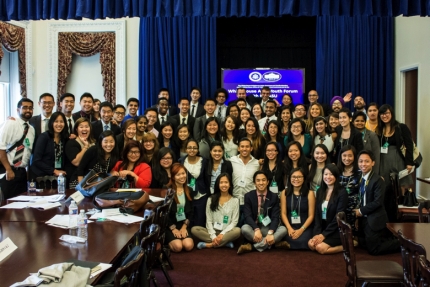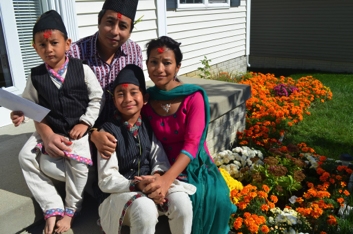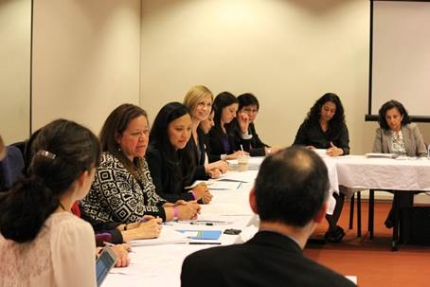Initiative on Asian Americans and Pacific Islanders Blog
Promoting Bullying Prevention Awareness in the Sikh American Community
Posted by on June 19, 2015 at 1:48 PM EDTOn June 8, 2015, the White House Initiative on Asian Americans and Pacific Islanders and the Sikh Coalition held a Bullying Prevention Sikh Google Hangout. As part of her capstone project in the E3! Ambassadors Program, Naureen Singh organized the discussion to educate Sikh American youth, parents, and community organizers about the resources available from the federal government to combat bullying.
Many Asian American and Pacific Islander (AAPI) students face bullying and harassment based on their appearance, including many Sikh turbaned youth. According to a 2014 Sikh Coalition study, nearly 70 percent of turbaned Sikh youth in Fresno, California reported experiencing bullying and harassment. In addition, a 2012 study found that half of the 163 Asian American New York City public school students surveyed reported experiencing some kind of bias-based harassment.
Numbers like these are simply unacceptable. As someone who understands firsthand what it feels like to be ostracized or shamed because of skin color, sexual orientation, or any other number of perceived differences, I’ve been working passionately with my fellow Commissioners and the Initiative staff to make sure our schools are a place where all students feel safe in order to have access to the education they deserve.
During the Google Hangout, I joined Gurjot Kaur from the Sikh Coalition to share the obstacles Sikh Americans face when dealing with bullying, to highlight some of their personal stories, and to discuss effective measures to respond to bullying when it occurs. Federal resources like StopBullying.gov serve as a valuable tool where readers can find information on how to prevent bullying such as campaigns and toolkits. In addition, the AAPI Bullying Prevention Task Force was created to help ensure that AAPIs are aware of the federal resources available to them and that the federal government is equipped to respond to the unique needs of our community. To that end, the Task Force is leading bullying prevention listening sessions around the country to learn firsthand about the experiences of AAPI students.
Furthermore, we discussed ways in which peers and adults alike can create a safe and supportive space to give students who are bullied the courage to speak up. We discussed the importance of reporting incidences of bullying to the schools, and how to file complaints with the U.S. Department of Justice and U.S. Department of Education Office for Civil Rights when schools fail to respond appropriately. Complaints filed with the federal government have the potential to result in resolution agreements that mandate changes for entire school districts. Above all, speakers highlighted that bullying can never be justified and that, in fact, our differences are something to celebrate.
This Google Hangout closed out the capstone projects series for 2015, and we look forward to re-launching the E3! Ambassadors Program at the fifth annual White House AAPI Youth Forum on July 9. The E3! Ambassadors program is an innovative way for young leaders to learn about federal resources available around issues that directly affect them, and to share those resources with their campuses and communities. It provides a unique platform for them to use their personal stories to affect change. I heartily congratulate Naureen for making this Google Hangout such a huge success. Stay tuned for more information on the 2015-2016 E3! Ambassador program application process and ways to impact your own local community.
Maulik Pancholy is a member of the President’s Advisory Commission on Asian Americans and Pacific Islanders.
Learn more aboutJoin the Fifth-Annual White House Asian American and Pacific Islander Youth Forum on July 9
Posted by on June 17, 2015 at 5:29 PM EDTOn July 9, 2015, the White House Initiative on Asian Americans and Pacific Islanders (AAPIs), White House Office of Public Engagement, and East Coast Asian American Student Union will host the fifth-annual White House AAPI Youth Forum to engage with young AAPI leaders. Participants will hear from Administration and community leaders on a wide range of issues, participate in issue-focused workshops, and have the opportunity to work with their peers to develop plans for addressing local issues.
- Event: White House Asian American and Pacific Islander Youth Forum
- Date: Thursday, July 9, 2015
- Time: 9:00 AM – 4:00 PM
- Location: The White House, Eisenhower Executive Office Building
- RSVP: Please complete and return this spreadsheet to WhiteHouseAAPI@ed.gov with subject line “RSVP – AAPI Youth Forum” by close of business on Wednesday, July 1. RSVPs will only be accepted until we reach capacity.
Learn more about#MyAAPIStory: Sanjita Pradhan
Posted by on June 17, 2015 at 1:00 PM EDTIn the spirit of Immigrant Heritage Month, the White House Initiative on Asian Americans and Pacific Islanders (AAPIs) celebrates the diverse dimensions of our nation’s communities and the strength we draw from our varied immigrant identities. From cultural traditions to philosophies, many of us are shaped by our own or our family’s immigrant experiences coming to this country and transitioning into the “American life.”
In this blog series, we will explore the immigration stories of different AAPI federal leaders and how these experiences have shaped their commitment to public service.
We invite you join the conversation by sharing these stories with your communities and on social media and also sharing your own stories and thoughts by using #MyAAPIStory.
Part 2: Sanjita Pradhan, Member of the President’s Advisory Commission on Asian Americans and Pacific Islanders
Learn more aboutPushing for Greater Inclusion of Asian American and Pacific Islander History Through the National Park Service
Posted by on June 12, 2015 at 4:20 PM EDTThe National Park Service (NPS) system and programs belong to all Americans, and we are working hard to ensure that they reflect the rich diversity of our nation. Through our AAPI Heritage Initiative, we are recognizing the stories of Asian Americans and Pacific Islanders (AAPIs) and their contributions to our country’s diverse history. The goals of the initiative are to identify physical places that are historically significant and capture intangible history.
As our nation’s storyteller, the NPS identifies and interprets sites that are associated with important events and people in American history. Many national park units are closely associated with AAPI history. For example, the National Park of American Samoa offers a unique homestay program that allows visitors to learn more about local culture. The Honouliuli Internment Camp was recently named a national monument, and joins the Minidoka National Historic Site and the Manzanar National Historic Site in telling the stories of Japanese Americans and others who were interned during World War II.
Learn more aboutThe Power of Stories: Celebrating Immigrant Heritage Month Through a Profile Series
Posted by on June 11, 2015 at 5:54 PM EDTIn the spirit of Immigrant Heritage Month, the White House Initiative on Asian Americans and Pacific Islanders (AAPIs) celebrates the diverse dimensions of our nation’s communities and the strength we draw from our varied immigrant identities. From cultural traditions to philosophies, many of us are shaped by our own or our family’s immigrant experiences coming to this country and transitioning into the “American life.”
In this blog series, we will explore the immigration stories of different AAPI federal leaders and how these experiences have shaped their commitment to public service.
We invite you join the conversation by sharing these stories with your communities and on social media and also sharing your own stories and thoughts by using #MyAAPIStory.
Part 1: Kiran Ahuja, Executive Director of the White House Initiative on Asian Americans and Pacific Islanders
Learn more aboutAsian American and Pacific Islander Community Engagement Roundtable with the U.S. Department of Health and Human Services
Posted by on June 5, 2015 at 11:51 AM EDTOn May 14, senior staff from the U.S. Department of Health and Human Services (HHS) hosted a Community Engagement Roundtable with 19 Asian American, Native Hawaiian, and Pacific Islander (AAPI) community health leaders, including three members of the President’s Commission on AAPIs to learn about barriers to health that AAPIs face. Officials from HHS included: Kevin Thurm, Senior Counselor to HHS Secretary Burwell; Jim Macrae, Acting Administrator of the Health Resources and Services Administration (HRSA); and representatives from the Office for Civil Rights, Office of Minority Health (OMH), the Centers for Medicare and Medicaid Services (CMS), and the Substance Abuse and Mental Health Services Administration (SAMHSA).
The AAPI community health leaders presented HHS with specific policy recommendations in five priority areas:
- Ensuring a strong safety net system
- Increasing enrollment under the Affordable Care Act
- Ensuring adequate coverage for mental health and substance abuse disorders
- Meeting the needs of Native Hawaiians
- Meeting the needs of AAPI women
Learn more about
- &lsaquo previous
- 1
- 2
- 3
- 4
- 5
- 6
- 7
- 8
- 9
- …
- next &rsaquo
White House Blogs
- The White House Blog
- Middle Class Task Force
- Council of Economic Advisers
- Council on Environmental Quality
- Council on Women and Girls
- Office of Intergovernmental Affairs
- Office of Management and Budget
- Office of Public Engagement
- Office of Science & Tech Policy
- Office of Urban Affairs
- Open Government
- Faith and Neighborhood Partnerships
- Social Innovation and Civic Participation
- US Trade Representative
- Office National Drug Control Policy
categories
- AIDS Policy
- Alaska
- Blueprint for an America Built to Last
- Budget
- Civil Rights
- Defense
- Disabilities
- Economy
- Education
- Energy and Environment
- Equal Pay
- Ethics
- Faith Based
- Fiscal Responsibility
- Foreign Policy
- Grab Bag
- Health Care
- Homeland Security
- Immigration
- Innovation Fellows
- Inside the White House
- Middle Class Security
- Open Government
- Poverty
- Rural
- Seniors and Social Security
- Service
- Social Innovation
- State of the Union
- Taxes
- Technology
- Urban Policy
- Veterans
- Violence Prevention
- White House Internships
- Women
- Working Families
- Additional Issues



